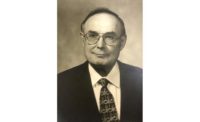The Agricultural Research Service (ARS) will induct a scientist, Dr. Timothy Smith, into its Science Hall of Fame for scientific achievements in leveraging genomic tools to improve livestock health and productivity.
Timothy P.L. Smith will be honored in a ceremony at the ARS National Agricultural Library in Beltsville, Md. ARS established the Hall of Fame program in 1986 to honor senior agency researchers for outstanding, lifelong achievements in agricultural science and technology. Nominees must be retired or eligible to retire to receive the award.
Smith, a research chemist with the U.S. Meat Animal Research Center's Genetics and Animal Breeding Research unit in Clay Center, Neb., was among the first to shape the direction and evolution of ARS's animal genomics program. As a member of the "Gene Mapping Group," Smith and his colleagues' publication of the first genetic maps of cattle, pigs and sheep won a USDA Secretary's award for excellence in 1994.
Smith's work has had direct impact on the livestock industry through development of genetic markers and DNA tests associated with production traits in cattle, pigs and sheep as well as genetic mutations that influence the physical expression of those traits in the animals.
For example, Smith's patent on markers associated with beef tenderness represent some of the first genetic markers that were put into commercial use (in 2003) and are still used on tens of thousands of beef cattle each year to select for the tenderness trait in beef cattle. He also led studies of a myostatin gene in Belgium Blue and Piedmontese cattle that determined two distinct gene mutations were responsible for the breeds' increased muscle mass trait, known as "double muscling." The paper describing this work has been cited over 1,600 times since being published in the journal Genome Research in 1997 — including 78 citations in 2022 alone.
Smith's contributions to ARS's genomic programs include initiating the transition from microsatellite marker-based maps to single nucleotide polymorphism (SNP) markers. This switch enabled genome-wide associations studies and better use of markers for trait selection than was possible with genome mapping.
Together with National Institutes of Health collaborators, Smith co-developed a method called "trio-binning" that improved the efficiency and accuracy of genome assemblies for livestock and humans by first sequencing forms of parental DNA that offspring inherit called haplotypes, which reside on a single chromosome.
His expertise in microbial and animal genomics has prompted speaker invitations from around the world and industry recognition for his achievements in promoting not only livestock health and productivity, but also food safety and environmental sustainability.
Source: USDA's ARS



Report Abusive Comment